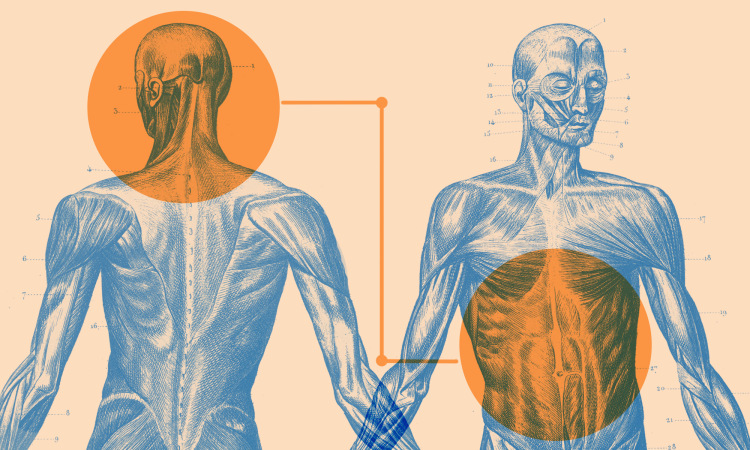A new study explores the possible link between certain types of gut bacteria and depression. The study, published in Nature Microbiology, examined gut bacteria from over 1,000 people and compared the results with self-report and physician-diagnosed depression data. The findings from the first population-level study on gut-bacteria and mental health provides evidence for the link between the microbiome and mental health.
“The relationship between gut microbial metabolism and mental health is a controversial topic in microbiome research,” the researchers, led by Jeroen Raes, a professor at the Catholic University of Leuven in Belgium, write.
“The notion that microbial metabolites can interact with our brain — and thus behaviour and feelings — is intriguing, but gut microbiome-brain communication has mostly been explored in animal models, with human research lagging behind.”

While the scientific community has been investigating the gut-brain link since the early 2000’s, little is known about the full implications the link may have for psychiatry and mental health practice. This first ever population-level study builds on previous research linking gut bacteria to mental health issues such as autism and depression. In previous work, Raes and colleagues identified a low microbial and biodiversity community among individuals with Crohn’s disease.
He writes, “This finding adds more evidence pointing to the potentially dysbiotic nature of the Bacteroides2 enterotype we identified earlier. Apparently, microbial communities that can be linked to intestinal inflammation and reduced wellbeing share a set of common features.”
In the current study, Raes and colleagues investigated the relationship between gut bacteria, quality of life, and depression. The researchers looked at data from 1,054 fecal microbiome samples from individuals with a diagnosis of depression enrolled in the Flemish Gut Flora Project. After identifying specific microorganisms correlated with depression, they found two groups of bacteria in particular, Coprococcus and Dialister, to be consistently depleted in individuals with depression.
“The contribution of [Quality of Life (QoL)] indicators and depression to overall microbiota community variation was in the range of (and added to) known major microbiome covariates. While Coprococcus and Dialister were both found to be positively associated with QoL and depleted in treatment-free depression, others, including Butyricicoccus, were found to be linked to antidepressant treatment.”
These findings were then validated with an independent sample of 1,063 individuals from the Dutch LifeLines DEEP (LLD) study and a cohort of clinically depressed patients from the University Hospital Leuven. Raes and colleagues report consistent findings across each of these populations.
“Butyrate-producing Faecalibacterium and Coprococcus bacteria were consistently associated with higher quality of life indicators. Together with Dialister, Coprococcus spp. were also depleted in depression, even after correcting for the confounding effects of antidepressants.”
This study represents the first of its kind to have been done on such a large scale in humans. With the majority of previous work being done on animals, this study provides a foundation for future investigations into the role gut bacteria may play in mental health. While groundbreaking, Raes and colleagues emphasize the need for more research on the topic.
“Our approach does not allow testing for causality nor directionality of microbiota–gut– brain axis interactions; however, it provides a panel of stringent associations taking into account the compositionality of microbiome data and potential confounding effects of antidepressant medication.”
****
Valles-Colomer, M., Falony, G., Darzi, Y., Tigchelaar, E. F., Wang, J., Tito, R. Y., … & Claes, S. (2019). The neuroactive potential of the human gut microbiota in quality of life and depression. Nature microbiology, 1. (Link)















we have a lot to learn
about CAUSATION…
Report comment
Gee. What a surprise, that having upset stomach and frequent diarrhea can be a bummer. Who would have thought it? Do we really need “research” to tell us such common sense stuff?
Report comment
The research on the microbiome has nothing to do with an upset stomach or diarrhea causing emotional distress. Though this article is suggesting some kind of controversy in the field, there is a well established two way neural communication system call the mind-gut axis and it’s known that bacterial digestion influences nearly all of our bodily functions. It’s also known that Americans have a radically decreased genetic diversity in our microbiome with much larger populations of harmful species. Much of this knowledge is not due to anyone caring about psychiatric patients, it has in fact come from the gastroenterology community in attempts to treat C.diff infections and finding the surprising result that the poop from a happy person can rapidly and profoundly change the mental state of the receiver of a fecal transplant.
It’s not surprising that Psychiatry is pushing back against research into the gut microbiome because it threatens the notion that cognition is solely or mainly a product of brain activity. That’s 20th century thinking though.
Report comment
It is also important to recall that the large majority of serotonin receptors are in the gut (90%, I believe?) So screwing with the serotonin system screws with the gut, and Lord knows what this does to our “microbiome.”
Report comment
Of course for real brain disorders you go to a neurologist. Not a “soul doctor” who denies souls exist.
My gut flora is very messed up thanks to 23 years on one SSRI or another. I needed those pills like a kick in the head. Or stomach.
Report comment
If you’re taking psych meds and experiencing neurological issues, expect to be told it’s a side effect of the medication and dismissed.
When I started having serious eye issues again, and balance issues worsened, and was having facial numbness, I went to a neuropthalmologist for screening for MS. He looked at my eyes and did an MRI, then told me the problems were side effects of Lamictal. While they may have been exacerbated by the drugs, they were symptoms of Lyme disease and no one cared enough to dig deeper because I was just a psych patient.
The drugs do damage, absolutely. They also cover up symptoms of underlying illness. How convenient.
Report comment
Neurological issues are indeed an effect of the drugs. Though the word “side” is inaccurate.
As Peter Breggin says, “That’s how they work.”
If they aren’t damaging your brain, liver, kidneys, gut, etc. they aren’t working.
Report comment
No, but you’d like to see some connection between “psychiatric” conditions and the health of one’s gut flora.
Report comment
It sure is taking a long time for the medical community to catch up to the scientific research that has been done on the microbiome for the last two decades. Just last week I was reading about a study in which mice received fecal transplants with bacteria found in the guts of people diagnosed with schizophrenia. These mice developed the symptoms of schizophrenia. When I spoke with my son’s psychiatrist about these studies he said he had never heard of them. You may be right kindredspirit, psychiatrists may be pushing back against this research because it threatens their beliefs, and also their future livelihood.
Report comment
Sometimes you just have to think outside the Bachs; get into a little Rachmaninoff.
Report comment
The original observations were in made by colleagues of the late Abram Hoffer, the Dark Lord of Canadian psychiatry, in the 1980’s and early 1990’s, which would certainly provide no impetus for investigations by loyal mainline Canadian shrinks.
Report comment
I wanted to throw a link in here to some just published research on the microbiome that tells more of the story of how our body’s bacterial populations affect our health:
https://amp.mindbodygreen.com/articles/the-microbiome-blood-sugar-connection-you-need-to-know-about
Report comment